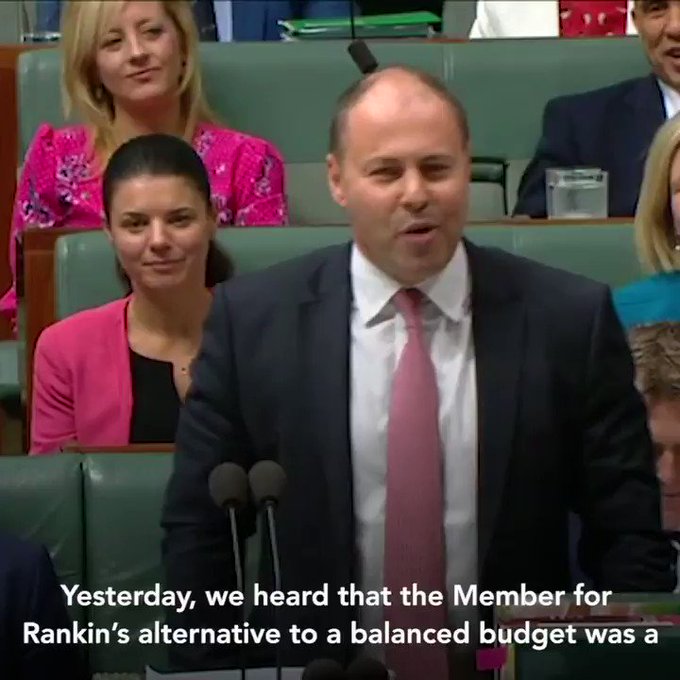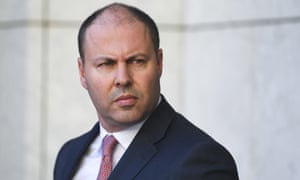Forget ‘back in black’, the treasurer is now working around the clock to keep Australians alive
It feels like a century ago now, a vignette from another life. But wedged between the catastrophic bushfires of the summer and the looming pandemic was a moment in the parliament when Josh Frydenberg really thought he was on a winner.
Before we get to our memorable moment in late February, some minor scene setting. The treasurer has a rolling shtick with his opposite number, Jim Chalmers, where he likes to frame the shadow treasurer as a noob barely out of short pants. Consider this niggling behaviour a display of dominance hierarchy.
Frydenberg and Chalmers are both former political staffers with eyes on big prizes. Frydenberg once worked for Alexander Downer and John Howard and Chalmers once worked for Wayne Swan. Political staff are a diverse bunch, like all humans, but speaking in generalities there is an alpha culture and, for the alphas, indulging in mind games, like who is top dog and who is L-plate dog, is considered sport in a vocation characterised by inveterate competition. It could actually be a survival tactic rather than adolescent indulgence. Presumably the regular adrenaline surges helps keep people alert when they’ve reached the 23rd hour of their regular workday.Before we get to our memorable moment in late February, some minor scene setting. The treasurer has a rolling shtick with his opposite number, Jim Chalmers, where he likes to frame the shadow treasurer as a noob barely out of short pants. Consider this niggling behaviour a display of dominance hierarchy.
Resuming our story, Frydenberg latched on to a proposal Chalmers had floated for Australia to consider adopting a wellbeing budget. On 29 February, Frydenberg lined up confidently at the dispatch box, smirking for Australia. “Yesterday, we heard the member for Rankin’s alternative to a balanced budget was a wellbeing budget, Mr Speaker.”
The treasurer put air quotes around “wellbeing” for emphasis, lest the thought crime be ambiguous.
This is a warning to every Australian.
Labor and @JEChalmers want to replace responsible economic management with a yoga mat, beads and a “wellbeing budget”.
Just another Labor excuse for higher taxes and bigger deficits
Labor and @JEChalmers want to replace responsible economic management with a yoga mat, beads and a “wellbeing budget”.
Just another Labor excuse for higher taxes and bigger deficits

“Now I want you to picture this alternative,” Frydenberg said. “The member for Rankin is about to deliver his first wellbeing budget. He walks in, barefoot, into the chamber … robes are flowing, incense is burning … beads in one hand and speech in the other … gone are the seats, gone are the benches … and in their place, meditation mats for all, Mr Speaker … hugs for all, Mr Speaker”.
It’s really instructive to review that footage now because it provides an archival glimpse of a moment, only a few weeks back, where the political class in Australia felt safe enough, when there was enough psychic surplus, to be smug. Frydenberg is so pumped he’s puffed up, and the percussive chortling and thigh thumping from the parliamentary peanut gallery is off the charts.
If you follow economic debates you’ll know that wellbeing budgets are a fledgling, but not radical, concept, so the riff was dumb at the time: a triumph of testosterone over reasoned reflection. I strongly suspect that Frydenberg, who is a good man – a person who makes a point of maintaining human decency in a profession where expressions of decency can be viewed as a weakness – grasped that it was dopey shortly after his student politics skit winged its way into the world, and not everybody laughed.
The point of recounting this episode is twofold. It reminds us that Australia and the world, and the intraday dynamics of political discourse, felt quantifiably different only a nanosecond ago.
"I think about the choices we'll make in coming weeks and months. I wonder what we'll be when this crisis finally passes"
This gathering crisis has picked us up and set us down in a different place. At the moment, I’m having have conversations with my friends about whether we are in 1929, 1981 or 1991 – or somewhere we’ve never been at all.
Secondly, as old mate Alanis once noted, isn’t it ironic? Frydenberg won’t badge his current endeavour of working up rolling fiscal stimulus as crafting an emergency wellbeing budget, particularly now that the regular budget has been delayed until October.
But the facts are clear. The treasurer is now working around the clock in pursuit of clear, humanist objectives: keeping people alive and preserving the economic health of Australia. Events have pushed the once risible objective of measuring and attaining wellbeing right to the centre of the national balance sheet.
All the pre-emptive self-congratulation of “back in black” is out. The measure of success now is not the shibboleths of neoliberal philosophy, but how many lives can be spared, and how many jobs and businesses can be maintained in the face of a profound global economic shock triggered by a health crisis – which is exactly as it should be.
The reasons for this rapid turnaround are obvious. Frydenberg is now confronting the grim reality of being the first Australian treasurer since Paul Keating to preside over a recession, when the life plan was to be the first since 2007-08 to unveil a budget surplus.
This is the second time Frydenberg has found himself enduring a short and sharp reversal of fortune because of circumstances largely beyond his own making. When he was energy minister, he thought he might be able to land a policy mechanism that could have ended a decade of partisan idiocy on emissions reduction, but that opportunity was taken out of his hands by colleagues who wanted Malcolm Turnbull gone more than they wanted to fix a problem that needed fixing.
When this storm passes, at some time in the future, when there is time to reflect, when the moment finally comes where he can exist inside his own head without interruption – Frydenberg will, I feel certain, start to wonder why he keeps waking up in someone else’s life.
The outlook over the coming months is really challenging. I’m weighing my words judiciously because it doesn’t help when people in my position start hyperventilating and machine gunning adjectives like dire or diabolical just to court someone’s five seconds of attention in the click-and-share economy. So I’ll just say things are really challenging and uncertain.
It was an extraordinary experience, standing in the prime ministerial courtyard on Thursday, with a handful of journalists and crews arrayed at appropriate social distancing ratios, to record the moment when the prime minister of Australia confirmed he would shut the border to visitors.
Just a few minutes earlier the government and the central bank resolved to pump more than $100bn into the financial system to keep credit flowing. The Reserve Bank governor told people to brace for a significant spike in unemployment, and to understand that the cash rate would remain at emergency levels for years.
With Australia walled off from the world for at least six months, I think about tourism businesses without customers. I think about sole traders who have put their life savings into businesses that won’t survive. I think of the kids who have just finished years of education and will try to enter a labour market that will not have enough jobs for them.
I think of the people who will lose jobs as a consequence of this downturn and may never work again, because that’s how these events pan out, even with the best will in the world. Most of all, I think of the health workers on the frontline, dealing with people who are sick and frightened, and their families. Like everyone I know, I worry about how little we know about this virus, and about how long it’s going to take to get a vaccine, which is the point at which the world turns the corner.
Holed up in Parliament House, which feels at the moment like a docked ghost ship, in semi-lockdown, with empty corridors and many people working remotely, I think about the choices we will all make in the coming weeks and months. I wonder what we will be when this crisis finally passes.
Given the hoarding, and the stampedes in our supermarkets, I wonder if pandemics destroy goodwill, rendering this closing bit of whimsy entirely redundant. But in a spirit of generosity, not I told you so, Chalmers might want to drop a meditation mat around to Frydenberg on Monday.
Perhaps some essential oils.
The treasurer might just need them.


No comments:
Post a Comment